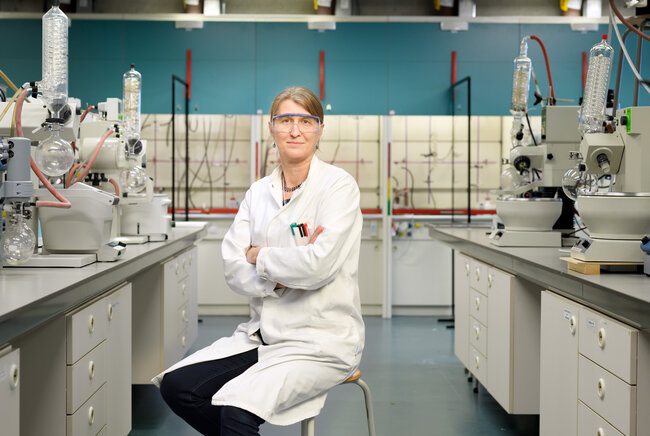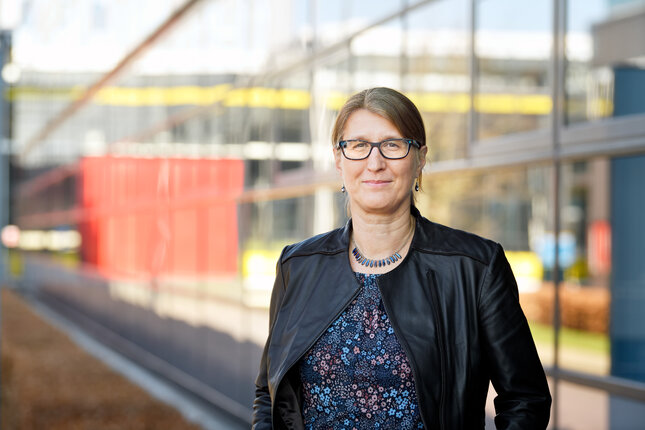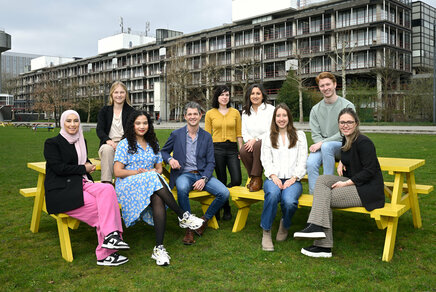Grateful for on-campus practical in corona times
Anja Palmans and her team are proving that practical education on campus can be delivered safely, even in times of corona.

In corona times, how do you teach 88 Chemical Engineering and Chemistry second-years the essential skills of working in the lab? With a laboratory practical of course, exhaustively prepared with some creative puzzling, online platform LabBuddy and the necessary precautionary COVID-19 measures. Anja Palmans and her team are proving that practical education on campus can be delivered safely.
It must have been an odd sight: a virtually empty lab during a second-year practical where 27 students would normally be milling about like worker bees in a hive. Now, only eight students were able to work in the modified 1m50 laboratory in Helix. This arrangement has its advantages, knows Anja Palmans, Full Professor of Supramolecular Chemistry & Catalysis, “If you have only eight students in the room, you can see exactly who is scared of chemicals, who has prepared well. They had to work individually now, so hiding behind a group was not an option. What's more, in a small group like this there is more opportunity to ask questions. It meant I really got to know everyone.”
Above all, it had to be done safely, we didn't want any corona infections
Tight planning, good preparation, strict precautionary measures and the online platform LabBuddy were indispensable to the practical being able to go ahead. “Above all, it had to be done safely; we didn't want to get any corona infections,” Palmans emphasizes. “And we didn't, fortunately, although when we started in November COVID figures were soaring. Fortunately, everyone was acutely aware of just how special it was to be able to do this on campus. Students were so grateful that they could work here. They followed the precautionary measures to the letter; hands were washed frequently. At that time the wearing of face masks was not compulsory in the Netherlands, but we did ask them to do so. And they did, without a murmur.”

During this practical second-years learn the principles of working in the lab. Normally, it comprises two experiments involving basic skills, one experiment in which the properties of a molecule are studied, and analytical chemistry. The group is divided into three and rotates between the tasks. “We had to produce an entirely different plan, and had to drop one experiment because it would have taken too much time. Unfortunately, we couldn't do the most enjoyable part, where as a group you look under the microscope at the thermal behavior of the molecules you've made. We have only one microscope of this type.”
MAKE THE DISH AND TASTE IT
The practical would never have been possible without the platform LabBuddy, developed in Wageningen. Here, working individually, students did their preparation. “But it certainly doesn't mean that lab work can be done entirely online. On your laptop you can prepare everything, but the actual doing and experiencing can't be done there. Similarly, preparing everything online doesn't make you a chef. You have to make the dish and taste it. It's just the same with chemistry.”
While Palmans plus her colleague Ghislaine Vantomme and three postdocs made sure everything went well in the lab, her colleague Jolanda Spiering ensured that everything ran smoothly behind the scenes. She planned the practical and ensured that in the laboratory itself corona-proof working was possible. “Everything was ready and waiting in the fume hood: the glassware, all the chemicals weighed and in beakers. Students normally do this themselves; weighing is a vital skill. But gathering around the balance was obviously out of the question.” And Palmans could hardly produce a couple of extra analytical balances - at 7,000 euros a piece - at the drop of a hat.
I'm lucky that I work in an experimental field
All in all, the students spent nine days at the department completing the practical: four days in the lab and five for the analytical work. The preparation and the debrief took place online. “They were so happy to be able to see each other again, after a couple of days you could see them really seeking out each other. It was one of the few occasions they've had to be in each other's company. When the lockdown started in March physical contact came to a halt.”
Palmans realizes all too well that she is lucky to be working in an experimental field. “On programs that mostly involve modeling, students and doctoral candidates are still sitting at home. Here, research was able to start up again back in May, albeit with small groups and under strict precautionary measures. But for us it is almost business as usual.”
More on our strategy

![[Translate to English:] [Translate to English:]](https://assets.w3.tue.nl/w/fileadmin/_processed_/c/f/csm_BvOF_2024_0319_AEV_license_TUe_Dirk_van_Meer_-_CORE_1__c976e259a5.jpg)

